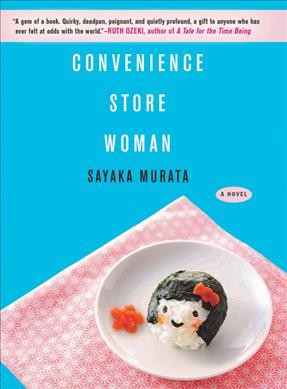 Convenience Store Woman by Sayaka Murata
Convenience Store Woman by Sayaka Murata
I was REALLY looking forward to reading this book, and it did not disappoint! It was not at all the book I was expecting to read, however. This is Sayaka Matura’s tenth book, and it is her first book to be translated into English. The narrator is Keiko, a quirky 36-woman who works at a convenience store in Japan. Keiko has never fit in, neither with her peers nor her family. She does not feel that she struggles to fit in, rather, she does not try to fit in. She is a careful observer of human behavior and learns how to mimic “normal” behavior in order to prevent her family and friends from worrying about her. When Keiko describes how she studies her coworkers’ speech patterns and learns when to use them, it is very relatable to anyone who has learned to observe their surroundings in an effort to please others, and make them more comfortable.
Keiko begins working at the convenience store when she is eighteen, and from the moment she watches the training video, she feels at home. For someone who does not think the same as others, and does not have the same reactions as others, Keiko finds comfort in the routine and prescribed, kind-of scripted speech she is instructed to use while working. There have been so many recent books with protagonists on the autism spectrum, or protagonists who are eccentric “misfits,” and I was initially disappointed that this book seemed to be in that category, not because I do not like them, but because I have read so many. . But this book goes further and really examines what defines “normal” behavior, especially in a society that highly-values conformity. Keiko’s internal voice is reflective yet harsh, like when Keiko realizes that her friends, family and colleagues do not know what to think about her, because her differences make her a challenge to their comfort in normality. Keiko observes, “the normal world has no room for exceptions and always quietly eliminates foreign objects, anyone who is lacking is disposed of.” Keiko knows that to be unmarried and working in a “dead end” job at her age makes her a “foreign object,” but she is neither self-pitying nor striving to change. Keiko’s blunt assessment of others can sometimes seem almost psychopathic, and it would have been interesting if the author explored that side of Keiko more thoroughly.
Keiko thrives in the predictable work of the convenience store. After working there for eighteen years, Keiko knows how the weather impacts sales of certain products and she knows exactly how to set up the displays to bring in the most sales. When a new man is hired to work with Keiko, everything begins to change. This is no enemies-to-lovers, or rescued-by-a-prince, or even beauty-and-the-beast trope (thank goodness). Keiko’s new coworker, Shiraha, is an unpleasant, lazy, man who blames everyone else for his problems. Like Keiko, Shiraha is very aware that he does not fit into society. Keiko and Shiraha decide to live together, even though they don’t like each other, and this image of normalcy is greatly reassuring to Keiko’s friends and family. Keiko realizes, “It appears that if a man and a woman are alone in an apartment together, people’s imaginations run wild and they’re satisfied regardless of the reality.” This was one of the most thought-provoking aspects of this book. In Keiko’s Japan, there is a high pressure to conform, especially for women. It is also true in America, possibly to varying degrees depending on one’s demographic. People have such a strong sense of security when they “understand’ others – categorizing gender, sexuality, appearances, etc., and there is still a deep need for establishing binary boundaries. Male or female? Married or single? Financially successful or struggling? This book reinforces the fact that for many people, they are more comfortable when they are able to classify others, even when those “others” are unhappy being classified, or deeply uncomfortable with the chosen labels.
This is a great book, one that I am still thinking about even after beginning my next book. It will be a great book-group choice, and it happens to be a pretty quick read. I definitely recommend it!


